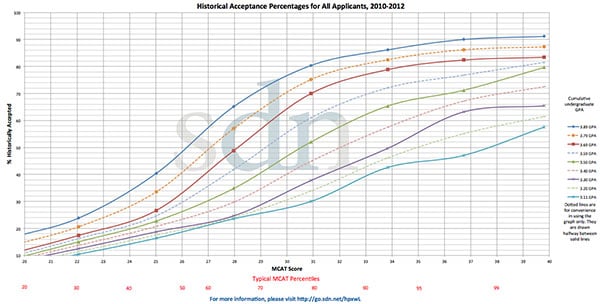6
625233
A 3.8+ gpa or 31+ mcat?
Thanks a bunch guys. Do you think there's a pretty solid correlation between how well you do in pre reqs and your MCAT score?
Thanks a bunch guys. Do you think there's a pretty solid correlation between how well you do in pre reqs and your MCAT score?

The data in this post is from last year. I'll update it as soon as I can with a current graph.
Which is better: a LizzyM score composed of a high GPA/low MCAT or the same LizzyM score created from a low GPA/high MCAT?

The available data suggests that your chances are slightly higher if your GPA contributes more to your LizzyM score.
Figure 12 (click on graph for higher resolution)
Blue dots: MCAT contributes more to your LizzyM score than the average matriculant (more than 46.6%)
Red dots: GPA contributes more to your LizzyM score than the average matriculant (more than 53.4%)
At my school, there were some majors where you could get a 4.0 with very minimal effort. At my brother's school, they had lots of very similar majors of differential difficulty. If you blew it at the main type of such a major, they would switch you to an easier version, and if you blew it there, they switched you to an even easier version. I think he said that people who couldn't cut it in a hard science major would get switched to exercise science, and if they couldn't hack it there, they got switched to physical education. If you just pick the easiest major from the start and use "rate my professor" to make sure you avoid the "tough" instructors in your major and gen-eds, you can get a 4.0 with very little effort.
You can't pull such shenanigans with the MCAT, you actually need to know a lot of things and be able to apply them. I would say that a 4.0 is easier to achieve than even a 28 on the MCAT, you just have to find a nice, grade inflating, school to go to, and then you are made in the shade if your goal is to get a 4.0 and you don't care whether you actually learned anything.
edit: FWIW, I earned a 3.995(not including 5 F's I earned in my first semester of college after which I dropped out and didn't return for 5 years) and a 35. The 3.995 was hard effort over a long time; the 35 was insane effort in a short time. I would liken it to being hit in the nuts with a wiffle bat 20 times versus being hit in the nuts with a sledgehammer once.
Sounds like U Chicago or PrincetonThe 3.8 gpa at my school is a gunner (the type who argues with professors/TAs about every grade less than A), but many have gotten a 37+ MCAT.
I hope your wrong but right now that's how I feel. Then again, I've yet to finish all pre reqsGunna go ahead and go against the grain and say 31+ MCAT
I also want to add that no one yet knows what sort of aptitudes will guarantee someone a great score on the MCAT 2015, as it will require a greater range of skills from test takers.
GPA is harder regardless of school, atleast for me. I always forget to do little homework assignments and stuff, or lose pointts on attendance, that lowers my grades :/

A meaningless comparison considering how much variance there is in grading between different schools.
95% of the students in my undergrad had below a 3.6 GPA. A 95th percentile on the MCAT is like a 35 or something.
Exactly.Time-wise a good GPA takes longer to obtain and maintain. You can also retake MCAT, but with GPA your options are limited. I haven't taken MCAT but it seems that many people run into a ceiling where they just can't improve their score significantly so I am personally more concerned with getting a good MCAT score than maintaining a 3.8 as I know for sure I can do the later but have no idea how I'll do on MCAT. It doesn't help seeing 4.0 students scoring in high twenties. I also prefer tests that are not cumulative and MCAT is only gonna get more content heavy.
That's me; I use Rate My Professor religiously, choose appropriate class loads to where I know I can excel, and take summer courses. I am cautious and realistic about how I choose classes. At the end of the day, who will look smarter? A student with a 3.9-4.0 with a strategic approach or the 3.5-3.6 who rushed through and sacrificed quality for quantity. Of course, GPA is only one factor in this equations, but I am not underestimating the MCAT, like many do.I'm frankensteining this thread.
I think it's easier to game your GPA than the MCAT.
I know some pre-meds who major in easy majors like psychology, took their pre-reqs over the summer with easy graders or at community colleges, or organize their schedule so that they always have easy classes to offset more difficult ones, so that they can still maintain a high GPA while taking what looks like a heavy course load. More so, cheating isn't rare among high achievers, at least at my school. I know people who always score well on difficult exams because their friends who took the class earlier gave them all the old exams that the teacher reused questions from and didn't make available to current students.
The MCAT, on the other hand, is standardized. It's meant to level the playing field and I think that it does a good job of it. My score speaks to my ability to understand the material that I was expected to learn compared to all other pre-meds, it doesn't penalize me for not knowing how to game my GPA.
